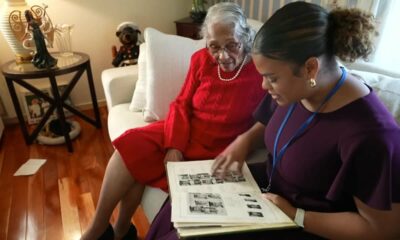Mississippi Today
Acupuncture advocate transforms holistic health care in Greenville


GREENVILLE – Sharon Johnson-Eby, a former respiratory therapist with 30 years of experience in the medical field, founded An Medi-Zen, a holistic clinic in Greenville, Mississippi, this year.

Johnson-Eby integrates Eastern and Western medicine to address local health disparities, offering services such as acupuncture, cupping therapy and herbal medicine.

Inspired by the success she found with acupuncture for her own asthma and acid reflux, Johnson-Eby earned a master’s degree in 2018 and a doctorate in 2019 from Northwestern Health Sciences University in Chinese Medicine.

“I got treated in the beginning of that first year of grad school for asthma and acid reflux,” Johnson-Eby said. “It basically changed everything for me.”

She completed a postdoctoral fellowship at the Academy of Integrative Health and Medicine in La Jolla, California. She is licensed in Minnesota and Mississippi and is board-certified by the National Certification Commission for Acupuncture and Oriental Medicine.

“I love Chinese medicine because we treat mind, body and spirit, and that’s something Western medicine might be missing.”
She moved from Bloomington, Minn. to Greenville in 2023 to be closer to her aging mother.

Supported by Delta State University’s Women’s Minority Business Incubator Program, Johnson-Eby emphasizes community outreach and education. At a wellness fair, she discovered that the local school district’s health care plan did not cover acupuncture and has since advocated for its inclusion with the insurance company.

“I’ve been working to highlight not just the benefits of acupuncture, but also its potential to improve overall health outcomes and reduce long-term health care costs. It’s about ensuring that everyone has access to the full spectrum of care they deserve.”

Johnson-Eby’s specialties include respiratory health, dermatology, mental health, and overall wellness using Traditional Chinese Medicine techniques. Driven by a childhood aspiration to become a doctor and in memory of a late friend, she plans to develop a comprehensive wellness center to integrate holistic practices into mainstream health care and address issues such as obesity, hypertension, and mental health.

This article first appeared on Mississippi Today and is republished here under a Creative Commons license.![]()
Mississippi Today
Legislation to license midwives dies in the Senate after making historic headway

A bill to license and regulate professional midwifery died on the calendar without a vote after Public Health Chair Hob Bryan, D-Amory, did not bring it up in committee before the deadline Tuesday night.
Bryan said he didn’t take the legislation up this year because he’s not in favor of encouraging midwives to handle births independently from OB-GYNs – even though they already do, and keeping them unlicensed makes it easier for untrained midwives to practice. The proposed legislation would create stricter standards around who can call themselves a midwife – but Bryan doesn’t want to pass legislation recognizing the group at all.
“I don’t wish to encourage that activity,” he told Mississippi Today.
Midwifery is one of the oldest professions in the world.
Proponents of the legislation say it would legitimize the profession, create a clear pathway toward midwifery in Mississippi, and increase the number of midwives in a state riddled with maternity health care deserts.
Opponents of the proposal exist on either end of the spectrum. Some think it does too much and limits the freedom of those currently practicing as midwives in the state, while others say it doesn’t do enough to regulate the profession or protect the public.
The bill, authored by Rep. Dana McLean, R-Columbus, made it further than it has in years past, passing the full House mid-February.
As it stands, Mississippi is one of 13 states that has no regulations around professional midwifery – a freedom that hasn’t benefited midwives or mothers, advocates say.
Tanya Smith-Johnson is a midwife on the board of Better Birth Mississippi, a group advocating for licensure.
“Consumers should be able to birth wherever they want and with whom they want – but they should know who is a midwife and who isn’t,” Smith-Johnson said. “… It’s hard for a midwife to be sustainable here … What is the standard of how much midwifery can cost if anyone and everyone can say they’re a midwife?”
There are some midwives — though it isn’t clear there are many — who do not favor licensure.
One such midwife posted in a private Facebook group lamenting the legislation, which would make it illegal for her to continue to practice under the title “midwife” without undergoing the required training and certification decided by the board.
On the other end of the spectrum, among those who think the bill doesn’t go far enough in regulating midwives, is Getty Israel, founder of community health clinic Sisters in Birth – though she said she would rather have seen the bill amended than killed. Israel wanted the bill to be amended in several ways, including to mandate midwives pay for professional liability insurance, which it did not.
“As a public health expert, I support licensing and regulating all health care providers, including direct entry midwives, who are providing care for the most vulnerable population, pregnant women,” she said. “To that end, direct entry midwives should be required to carry professional liability insurance, as are certified nurse midwives, to protect ill-informed consumers.”
The longer Mississippi midwives go without licensure, the closer they get to being regulated by doctors who don’t have midwives’ best interests in mind.
That’s part of why the group Better Birth felt an urgency in getting legislation passed this year.
“I think there’s just been more iffy situations happening in the state, and it’s caused the midwives to realize that if we don’t do something now, it’s going to get done for us,” said Erin Raftery, president of the group.
Raftery says she was inspired to see the bill make headway this year after not making it out of committee several years in a row.
“We are hopeful that next year this bill will pass and open doors that improve outcomes in our state,” she said. “Mississippi families deserve safe, competent community midwifery care.”
This article first appeared on Mississippi Today and is republished here under a Creative Commons license.![]()
Mississippi Today
New Mississippi legislative maps head to court for approval despite DeSoto lawmakers’ objections

Voters from 15 Mississippi legislative districts will decide special elections this November, if a federal court approves two redistricting maps that lawmakers approved on Wednesday.
The Legislature passed House and Senate redistricting maps, over the objections of some Democrats and DeSoto County lawmakers. The map creates a majority-Black House district in Chickasaw County and creates two new majority-Black Senate districts in DeSoto and Lamar counties.
“What I did was fair and something we all thought the courts would approve,” Senate President Pro Tempore Dean Kirby told Mississippi Today on the Senate plan.
Even though legislative elections were held in 2023, lawmakers have to tweak some districts because a three-judge federal panel determined last year that the Legislature violated federal law by not creating enough Black-majority districts when it redrew districts in 2022.
The Senate plan creates one new majority-Black district each in DeSoto County and the Hattiesburg area, with no incumbent senator in either district. To account for this, the plan also pits two incumbents against each other in northwest Mississippi.
READ MORE: See the proposed new Mississippi legislative districts here.
The proposal puts Sen. Michael McLendon, a Republican from Hernando, who is white, and Sen. Reginald Jackson, a Democrat from Marks, who is Black, in the same district. The redrawn district contains a Black voting-age population of 52.4% and includes portions of DeSoto, Tunica, Quitman and Coahoma counties.
McLendon has vehemently opposed the plan, said the process for drawing a new map wasn’t transparent and said Senate leaders selectively drew certain districts to protect senators who are key allies.
McLendon proposed an alternative map for the DeSoto County area and is frustrated that Senate leaders did not run analytical tests on it like they did on the plan the Senate leadership proposed.
“I would love to have my map vetted along with the other map to compare apples to apples,” McLendon said. “I would love for someone to say, ‘No, it’s not good’ or ‘Yes, it passes muster.’”
Kirby said McLendon’s assertions are not factual and he only tried to “protect all the senators” he could.
The Senate plan has also drawn criticism from some House members and from DeSoto County leaders.
Rep. Dan Eubanks, a Republican from Walls, said he was concerned with the large geographical size of the revised northwest district and believes a Senator would be unable to represent the area adequately.
“Let’s say somebody down further into that district gets elected, DeSoto County is worried it won’t get the representation it wants,” Eubanks said. “And if somebody gets elected in DeSoto County, the Delta is worried that it won’t get the representation it wants and needs.”
The DeSoto County Board of Supervisors on Tuesday published a statement on social media saying it had hired outside counsel to pursue legal options related to the Senate redistricting plan.
Robert Foster, a former House member and current DeSoto County supervisor, declined comment on what the board intended to do. Still, he said several citizens and business leaders in DeSoto County were unhappy with the Senate plan.
House Elections Chairman Noah Sanford, a Republican from Collins, presented the Senate plan on the House floor and said he opposed it because Senate leaders did not listen to his concerns over how it redrew Senate districts in Covington County, his home district.
“They had no interest in talking to me, they had no interest in hearing my concerns about my county whatsoever, and I’m the one expected to present it,” Sanford said. “Now that is a lack of professional courtesy, and it’s a lack of personal respect to me.”
Kirby said House leaders were responsible for redrawing the House plan and Senate leaders were responsible for redrawing the Senate districts, which has historically been the custom.
“I had to do what was best for the Senate and what I thought was pass the court,” Kirby said.
The court ordered the Legislature to tweak only one House district, so it had fewer objections among lawmakers. Legislators voted to redraw five districts in north Mississippi and made the House district in Chickasaw County a majority-Black district.
Under the legislation, the qualifying period for new elections would run from May 19 to May 30. The primaries would be held on August 5, with a potential primary runoff on Sept. 2 and the general election on Nov, 4.
It’s unclear when the federal panel will review the maps, but it ordered attorneys representing the state to notify them once the lawmakers had proposed a new map.
This article first appeared on Mississippi Today and is republished here under a Creative Commons license.![]()
Mississippi Today
5th Circuit panel denies JPD detective’s qualified immunity claim in all but one instance

Judges for the 5th U.S. Circuit Court of Appeals raised questions this week about the high court’s qualified-immunity doctrine, which critics say has long protected bad law enforcement officers.
The 5th Circuit panel of judges ruled that qualified immunity won’t protect a Jackson police detective in a case where she wrongfully arrested an innocent man.
“We readily acknowledge the legal, social, and practical defects of the judicially contrived qualified immunity doctrine,” Judge Don R. Willett wrote in a 2-1 decision, “but we are powerless to scrap it … [as] middle-management circuit judges.”
On Feb. 13, 2020, someone shot Nicholas Robertson, who knocked on the door of Avery Forbes’ home in Jackson and died there.
Two months later, police arrested Samuel Jennings on an unrelated charge. He told police that Desmond Green told him that he had killed Robertson.
The accusation stunned Green, who told police he didn’t know Robertson, much less take part in his murder.
Despite that, Detective Jacquelyn Thomas and Hinds County prosecutors encouraged the grand jury to indict Green, who was jailed without bond, with armed robbery being the underlying felony that elevated it to capital murder. He spent nearly two years behind bars for a crime he did not commit.
Two years later, Jennings recanted, and Green was finally freed from jail after 22 months. In his lawsuit, he alleges that Thomas used the statement of a jailhouse informant high on drugs, manipulated a photo lineup and withheld evidence from a grand jury that would have shown he was innocent.
“There was no evidence showing I was involved, so why was I arrested?” Green told Mississippi Today. “My life was on the line the whole time, and I was never allowed to speak to the judge until two years later. I lost time that I’ll never get back.”
Thomas asked for the lawsuit to be dismissed on the basis of qualified immunity, a legal doctrine created in 1967 by the U.S. Supreme Court, which determined that Jackson police officers who arrested ministers who entered a whites-only waiting room were immune from litigation because the officers were acting in “good faith.”
U.S. District Judge Carlton W. Reeves declined to dismiss the lawsuit.
That doctrine “means persons wronged by government agents cannot sue those agents unless the Supreme Court previously found substantially the same acts to be unconstitutional,” Reeves wrote. “A cynic might say that with qualified immunity, government agents are at liberty to violate your constitutional rights as long as they do so in a novel way.”
He called for juries, not judges, to rule on whether officers were guilty of bad acts. “Congress’s intent to protect citizens from government abuse cannot be overridden by judges who think they know better,” he wrote. “As a doctrine that defies this basic principle, qualified immunity is an unconstitutional error. It is past time for the judiciary to correct this mistake.”
Thomas appealed Reeves’ ruling to the 5th Circuit, saying she was “immunized against reasonable mistakes.”
In his statement to Thomas, Jennings said Green confessed that he killed Robertson and moved his body, but evidence showed a much different set of facts: Robertson was shot at one location and, still conscious, arrived at a different location where he was later found dead, wrote Willett, who was appointed by President Trump.
In addition, Robertson was with another man besides Green shortly before the shooting, Willett wrote.
“Accepting Green’s allegations as true,” he wrote, “Detective Thomas had information which would have undercut any reasonable belief that Green murdered Robertson.”
In March 2022, Samuel Jennings recanted his statement to Thomas, saying he was “just high” and trying to get out of jail. Jennings said he initially pointed to the first photo in a photo lineup, only to have the detective steer him instead to the fifth photo, which was Green.
“This method of identification, if true, is the very type of ‘unlawful’ and ‘suggestive’ identification for which we have previously denied qualified immunity,” Willett wrote.
A month later, prosecutors remanded Green’s capital murder charges to the files, and he was released from jail.
A year later, Green sued Thomas and the city for malicious arrest and prosecution “without probable cause.” Green alleged that the detective withheld evidence from the grand jury that would have shown his innocence.
Thomas insists that she deserves qualified immunity because a grand jury indicted Green. The 5th Circuit judges disagreed.
“Green’s pleadings are sufficient to suggest Detective Thomas materially tainted the grand jury proceedings,” Willett wrote.
They concluded that Thomas wasn’t entitled to qualified immunity on Green’s Fourth Amendment false arrest and 14th Amendment due process claims, but they did grant her qualified immunity with regard to the claim of malicious prosecution.
“Qualified immunity does not protect government officials ‘who knowingly violate the law,’” Willett wrote. “Based on the allegations in the complaint, Detective Thomas falls into that camp.”
Tupelo attorney Jim D. Waide III, who is representing Green, called it “encouraging” that the 5th Circuit would “largely follow the very thorough opinion that Judge Reeves wrote. There are obviously judges on the 5th Circuit that disagree with qualified immunity as much as Judge Reeves does.”
Sheridan A. Carr, special assistant to the Jackson city attorney, said the 5th Circuit did reaffirm the federal commitment to qualified immunity.
“While we respect the court’s ruling, we believe the evidence will ultimately support Detective Thomas and the City, and we expect a favorable outcome as the legal process continues,” Carr responded by email. “This ruling was made at the motion to dismiss stage, where the court was required to accept the plaintiff’s allegations as true without considering any evidence or the full context of the case. We remain confident that a more complete and accurate picture will emerge after the facts have been fully developed through discovery.”
This article first appeared on Mississippi Today and is republished here under a Creative Commons license.![]()
-

 News from the South - Virginia News Feed6 days ago
News from the South - Virginia News Feed6 days agoVirginia woman getting ready to celebrate 100th birthday: 'I have really enjoyed life'
-

 News from the South - Florida News Feed4 days ago
News from the South - Florida News Feed4 days ago4 killed, 1 hurt in crash after car attempts to overtake another in Orange County, troopers say
-

 News from the South - Virginia News Feed5 days ago
News from the South - Virginia News Feed5 days agoStorm chances Wednesday, rollercoaster temperatures this weekend
-

 Mississippi Today6 days ago
Mississippi Today6 days agoMississippi private prison OK’d to hold more ICE detainees
-

 News from the South - Oklahoma News Feed5 days ago
News from the South - Oklahoma News Feed5 days agoOklahoma Department State Department of Health hit with no confidence vote
-

 Mississippi Today4 days ago
Mississippi Today4 days agoJudge’s ruling gives Legislature permission to meet behind closed doors
-

 News from the South - Oklahoma News Feed6 days ago
News from the South - Oklahoma News Feed6 days agoWarner Bros. demands removal of Chickasha's iconic leg lamp
-

 News from the South - Louisiana News Feed10 hours ago
News from the South - Louisiana News Feed10 hours agoRemarkable Woman 2024: What Dawn Bradley-Fletcher has been up to over the year











































